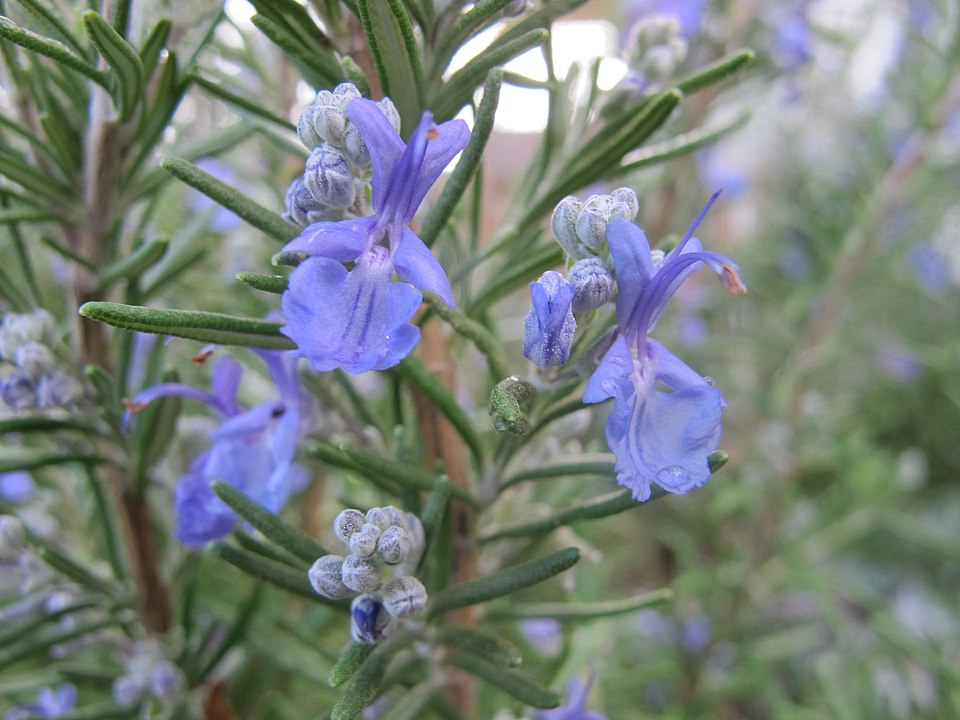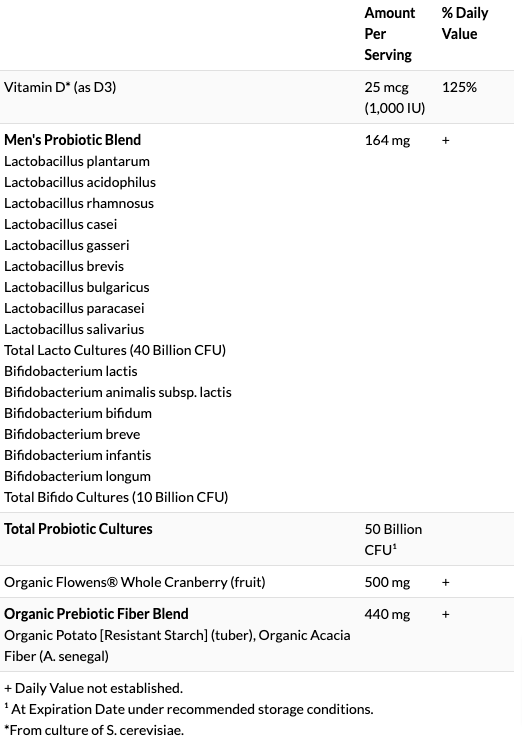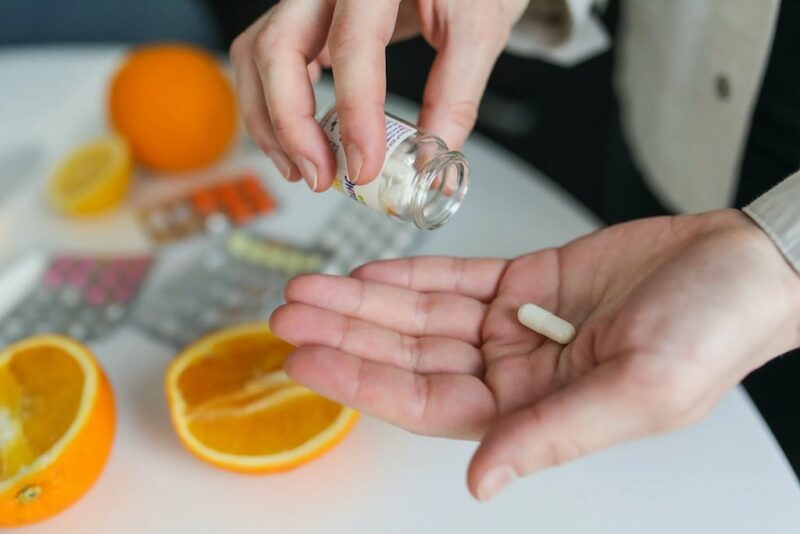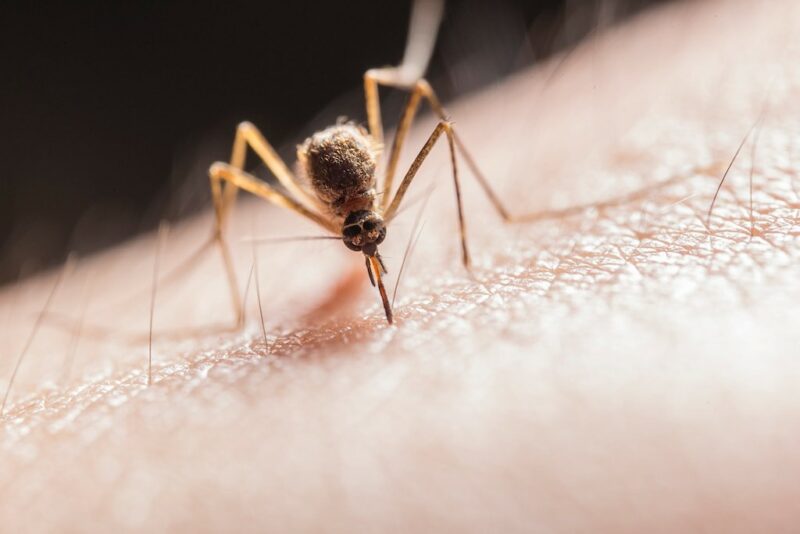The prostate is an important component of the male reproductive system and also plays a significant role in the urinary system. As men age, the risk of developing prostate-related diseases such as prostate cancer and benign prostatic hyperplasia (BPH) greatly increases. This article introduces the ingredients of common prostate supplements on the market and relevant scientific research.
- Prostate problems are common in middle-aged men
- Are prostate supplements effective?
- PalmettoGuard: Prostate Health and Overall Wellness Supplement
- Probiotics Prostate+: Supplement for Prostatitis and Gut Health
- NOW Foods Beta-Sitosterol: Supplement for BPH
- Pygeum & Saw Palmetto: Supplement for Prostatitis and BPH
- ProstateMD: Urinary and Prostate Health Supplement
Prostate problems are common in middle-aged men
The prostate is a gland located below the bladder, surrounding the upper part of the urethra. It produces most of the fluid in semen. The prostate can primarily experience three conditions, including:
1. Acute or chronic prostatitis
The prevalence of prostate infection and inflammation is estimated to be between 11% and 16%. It can cause pain and, in severe cases, lead to sexual dysfunction and urinary problems. Some patients may also experience symptoms such as fatigue and depression. Prostatitis is the most common reason for urology visits in men under 50 years old, and middle-aged men are at higher risk for this condition. Nonbacterial prostatitis is the most common type, which may be triggered by stress and irregular sexual activity. Bacterial prostatitis, on the other hand, can be caused by bacteria, viruses, or even sexually transmitted infections.
2. Benign prostatic hyperplasia (BPH)
Also known as “prostate enlargement,” BPH (Benign Prostatic Hyperplasia) is a non-cancerous condition characterized by the enlargement of the prostate, often leading to lower urinary tract symptoms. As men age, the prostate can become inflamed or enlarged, causing compression of the urethra and making urination difficult. BPH is caused by hormonal changes, zinc deficiency, and vascular aging. It is closely related to age, typically appearing around the age of 40 and affecting up to 90% of men over 70. Family history, obesity, type 2 diabetes, and erectile dysfunction may increase the risk of BPH.
3. Prostate cancer
Prostate cancer is a cancer that develops in the prostate gland and is the fourth leading cause of male death worldwide. In the United States, prostate cancer is the third leading cause of male death, following lung cancer and colorectal cancer. Approximately 1 in every 39 men dies from prostate cancer. Factors such as race, geographic location, family history, and genetic changes may increase the risk of developing prostate cancer. Additionally, diet, smoking, and sexually transmitted infections can also impact the development of prostate cancer.
Prostate cancer has a long latency period, and early stages may be asymptomatic. Many men develop the disease in their 20s or 30s, and symptoms worsen with age, peaking between 75 and 80 years old. Common symptoms of prostate diseases include:
- Weak urine flow
- Frequent urination
- Pain or burning sensation during urination
- Blood in urine or semen
- Pain in the lower back, hips, or pelvic area
- Fatigue
- Dizziness
- Shortness of breath
Supplements cannot cure or resolve prostate-related problems. However, many supplements claim to help prevent or alleviate symptoms associated with prostate issues.
Are prostate supplements effective?
Unfortunately, there is no definitive conclusion regarding this question. Studies suggest that some prostate supplements may help reduce the risk of prostate cancer, while others focus on promoting prevention of other prostate diseases.
Among the various ingredients, saw palmetto, beta-sitosterol, and pygeum have received relatively extensive research. However, the FDA has not approved these ingredients as therapeutic drugs.
- Saw palmetto extract is derived from a shrub-like palm tree native to the United States. It has been studied for its potential to reduce prostate enlargement.
- Beta-sitosterol has been suggested to have potential benefits in alleviating symptoms associated with prostate cancer.
- Based on limited human studies, Pygeum has shown promise in reducing inflammation related to prostatitis and inhibiting cancer cell growth.
However, although the ingredients used in prostate supplements aim to support prostate health, the research findings are often inconsistent. Special attention should be given to selenium and vitamin E—despite manufacturers promoting their efficacy in promoting prostate health, a study published in the Journal of the National Cancer Institute in 2011 reached the opposite conclusion: vitamin E may actually increase the risk of developing prostate cancer. [1]
Please remember that dietary supplements cannot cure or treat prostate inflammation, BPH, or prostate cancer. If you notice any potential symptoms of prostate infection or cancer, it is essential to consult with a doctor.
PalmettoGuard: Prostate Health and Overall Wellness Supplement
Life Extension, established in 1980, is a well-established health and nutrition company that manufactures and sells a variety of products for health management and disease prevention. PalmettoGuard is their prostate product line, and as the name suggests, all the products in this line contain Saw Palmetto extract. PalmettoGuard offers three formulations: Ultra Prostate Formula (comprehensive formula), Saw Palmetto & Beta-Sitosterol, and Saw Palmetto, Nettle Root & Beta-Sitosterol.
Ultra Prostate Formula is the best-selling among the three, containing over ten ingredients. However, we found that research on some of the ingredients is limited, and it also includes two patented blend ingredients, making it harder to determine their specific effects.
Our recommended formulation is Saw Palmetto, Nettle Root, and Beta-Sitosterol, which contains five active ingredients: Saw Palmetto, beta-sitosterol, nettle root extract, boron, and rosemary extract. Research on the first three ingredients is relatively more extensive and up-to-date. Although boron does not have research indicating direct preventive or therapeutic effects on prostate diseases, observational studies have shown an inverse relationship between boron intake and the risk of prostate cancer. Rosemary, besides being a natural preservative, has been suggested to possess certain anti-tumor properties.
*60 softgels; price at the time of writing; discounts available for subscription
1. Ingredient List
| Ingredients | Amount Per Serving |
|---|---|
| Saw Palmetto Extract | 160 mg |
| Beta-Sitosterol | 45 mg |
| Nettle Extract (root) | 120 mg |
| Boron | 1.5 mg |
| Rosemary Extract (leaf) | 400 mcg |
2. Key Benefits
- Supports male prostate health
- Helps maintain normal urinary tract health
- Promotes healthy hormone metabolism
- Nettle root extract provides additional support for prostate and urinary tract health
3. How to Use
Take 2 softgels daily, once in the morning and once in the evening, or as directed by a healthcare professional.
PalmettoGuard products are non-GMO, gluten-free certified, and each batch of the product has an analysis certificate (COA*). The products are manufactured in NSF-certified cGMP facilities. However, it’s important to note that this supplement is not suitable for vegetarians.
Fun fact: What is a COA?
COA stands for Certificate of Analysis, an official document provided by supplement manufacturers or suppliers. This document verifies and confirms the quality and contents of the product. The specific contents of a COA may vary, but it typically includes information about the product composition, concentration of active ingredients, the presence of any impurities or contaminants, test results for each specification, information about the person responsible for the testing and their signature, and may also include details regarding the testing methods and compliance with applicable regulations and standards. The certificate serves several purposes:
- Provides assurance that the product contains the listed ingredients and does not contain harmful substances or contaminants.
- Demonstrates that the product meets the quality standards set by regulatory agencies such as the FDA.
- Enhances transparency and traceability of the product for consumers and other stakeholders.
When purchasing dietary supplements, especially from new or lesser-known suppliers, it is important to request a COA.
4. Scientific Research
Saw Palmetto
Saw Palmetto is one of the most common ingredients in prostate health supplements. In specific applications, Saw Palmetto berry extract is often used to alleviate urinary symptoms associated with benign prostatic hyperplasia (BPH). The exact mechanism of action is not clear, but it is widely believed that Saw Palmetto’s anti-inflammatory effects play an important role. Studies suggest that Saw Palmetto may reduce the number of estrogen and dihydrotestosterone (DHT) receptors. DHT is a hormone that may be involved in prostate growth.

Image: Ted Bodner, Southern Weed Science Society
- A study involving 165 patients with BPH found that taking 160 mg of Saw Palmetto extract capsules four times a day for 12 weeks significantly improved prostate symptom scores, urine flow rates, and quality of life scores. [2] Trusted Website PubMed is a data base from US National Institutes of Health. It’s a trusted source of health and medical information. Open the link →
- Another early study found that men who took Saw Palmetto supplements for 3-6 months experienced improvements in urinary symptoms associated with BPH. [3] Trusted Website PubMed is a data base from US National Institutes of Health. It’s a trusted source of health and medical information. Open the link →
However, the research results on the effectiveness of Saw Palmetto for BPH symptoms are inconsistent.
- A 2012 study involving over 5,600 participants suggested no significant difference between Saw Palmetto and placebo in treating BPH symptoms. The National Center for Complementary and Integrative Health subsequently reiterated similar findings. [4] Trusted Website NCBI, US National Center for Biotechnology Information, is a trusted source of biotechnology and biomedicine information. Open the link →
It may take at least 4-6 weeks to see beneficial results from Saw Palmetto. Also, most studies have focused on individuals diagnosed with BPH or other prostate issues, and it is currently unclear whether dietary supplements can prevent urinary symptoms related to the prostate in healthy adults.
- In vitro studies have shown that Saw Palmetto may help inhibit the proliferation and growth of prostate cancer cells, but this protective effect has not been confirmed in humans. [5] Trusted Website PubMed is a data base from US National Institutes of Health. It’s a trusted source of health and medical information. Open the link →
Generally, Saw Palmetto is considered safe, but some individuals may experience adverse reactions. Common side effects include headache, dizziness, nausea, constipation, and allergic reactions.
Beta-sitosterol
Beta-sitosterol is a type of “plant sterol,” a naturally occurring steroid produced by plants. It is also found in Saw Palmetto. Research suggests that beta-sitosterol has potent antioxidant and anti-inflammatory properties. Many studies also indicate that beta-sitosterol has potential health benefits in reducing inflammation associated with benign prostatic hyperplasia (BPH) and possibly preventing prostate cancer.
- A 2019 review study on the intake of plant sterols, including beta-sitosterol, and cancer risk found an overall association between plant sterol intake and reduced cancer risk. [6] Trusted Website NCBI, US National Center for Biotechnology Information, is a trusted source of biotechnology and biomedicine information. Open the link →
- In another study involving 91 symptomatic BPH patients, researchers compared the effects of Saw Palmetto oil enriched with beta-sitosterol to plain Saw Palmetto oil or placebo. The study found that over a 12-week period, Saw Palmetto oil enriched with beta-sitosterol significantly reduced the severity of urinary symptoms compared to plain Saw Palmetto oil or placebo. [7] Trusted Website NCBI, US National Center for Biotechnology Information, is a trusted source of biotechnology and biomedicine information. Open the link →
According to WebMD, daily intake of 60-130 mg of beta-sitosterol, divided into multiple doses, helps improve symptoms of benign prostatic hyperplasia (BPH). Further research is still needed to understand the effectiveness and optimal dosage of beta-sitosterol for prostate health.
Nettle root
Stinging nettle, scientifically known as Urtica dioica, is a plant whose root is commonly used in alternative medicine for pain relief and inflammation. Early research has shown that stinging nettle root contains various compounds with significant antioxidant, anti-inflammatory, and antibacterial effects. Stinging nettle root is often used in supplements for treating urinary and bladder infections. [8] Trusted Website NCBI, US National Center for Biotechnology Information, is a trusted source of biotechnology and biomedicine information. Open the link →

Image: Skalle-Per Hedenhös / Wikipedia
Animal and human studies have found that stinging nettle root may help alleviate lower urinary tract symptoms associated with benign prostatic hyperplasia (BPH).
- In a six-month study conducted in 2005 with 558 symptomatic adult men with BPH, it was found that taking 120 milligrams of stinging nettle root extract three times a day significantly improved lower urinary tract symptoms compared to placebo. [9] Trusted Website PubMed is a data base from US National Institutes of Health. It’s a trusted source of health and medical information. Open the link →
- In vitro and animal experiments also suggest that stinging nettle root may have anticancer effects, although there is currently no research confirming its efficacy in preventing prostate cancer in humans. [10] Trusted Website PubMed is a data base from US National Institutes of Health. It’s a trusted source of health and medical information. Open the link →
It should be noted that most of the research on the impact of stinging nettle root extract on prostate health is relatively limited and dates back to earlier times.
Boron
Boron is a trace element that naturally occurs in many foods and can also be obtained as a dietary supplement. Currently, research has not determined the exact role of boron in human biological functions, so it is not classified as an essential nutrient for humans.
However, some studies suggest that boron may have positive effects on certain bodily functions, such as reproduction and development, calcium metabolism, bone formation, brain function, and the immune system, among others. There is preliminary evidence that dietary boron intake may impact cancer risk, with a negative correlation between boron intake and prostate cancer risk in men.
- In a 2011 observational study conducted in Turkey, two prostate cancer risk factors, prostate size, and prostate-specific antigen (PSA) levels, were evaluated. The study found that men with higher boron intake (approximately 6 mg per day) had significantly smaller prostates compared to men with lower boron intake (0.64-0.88 mg per day). However, there was no significant difference in PSA levels between the two groups. [11] Trusted Website PubMed is a data base from US National Institutes of Health. It’s a trusted source of health and medical information. Open the link →
Currently, there are no clinical trials evaluating the effects of boron on cancer prevention or treatment, including prostate cancer.
What is PSA?
PSA stands for Prostate-Specific Antigen, a protein produced by the prostate gland. PSA levels can be detected in the blood and are used for diagnosing prostate diseases, especially prostate cancer. In healthy men, the levels of prostate-specific antigen are typically low. However, if there are issues with the prostate, such as prostatitis, benign prostatic hyperplasia (BPH), or prostate cancer, PSA levels may be elevated. A rapid increase in PSA levels over a short period of time may require further medical evaluation. Regular monitoring of PSA levels can help in early detection and treatment of prostate diseases.
Rosemary
Rosemary possesses antioxidant and anti-inflammatory properties and is often used as a natural preservative to extend the shelf life of perishable foods. The impact of rosemary on prostate health has also attracted researchers’ attention.

Image: Margalob / Wikipedia
- Studies have found that rosemary extract may have anti-tumor properties and can even inhibit the survival of prostate cancer cells and induce apoptosis. It is speculated that rosemary and its antioxidant components may provide some protective effects for prostate health. [12] Trusted Website NCBI, US National Center for Biotechnology Information, is a trusted source of biotechnology and biomedicine information. Open the link →
Probiotics Prostate+: Supplement for Prostatitis and Gut Health
The unique feature of Garden of Life’s Dr. Formulated Probiotics Prostate+ is that it contains beneficial ingredients for both gut health and prostatitis: probiotics and cranberry extract.
Probiotics are beneficial gut bacteria that have been shown to be associated with various health benefits, including supporting the immune system and promoting digestive health. Imbalance of bacteria in the gut is considered another potential risk factor for prostatitis and prostate cancer. Cranberry extract contains an antioxidant called proanthocyanidins (PACs), most well-known for its application in treating urinary tract infections. Research suggests that cranberry also has health benefits in alleviating symptoms of prostatitis and potentially resisting prostate cancer.
*60 capsules; price at the time of writing
This supplement is gluten-free, non-GMO verified, and tested by NSF, a third-party testing organization. It is not suitable for vegans.
1. Ingredient List
| Ingredients | Amount per Serving |
|---|---|
| Probiotic Blend | 164 mg |
| Cranberry Extract | 500 mg |
| Organic Prebiotic Fiber Blend | 440 mg |
2. Key Benefits
- Supports lower urinary tract and normal urine flow, as well as prostate health
- Promotes balanced digestion and a healthy immune system
3. How to Use
Adults are recommended to take 2 capsules daily, either on an empty stomach or with a meal. Capsules can be opened, and the contents can be taken directly with water or juice. This product is not intended for children.
4. Scientific Research
Probiotic
Probiotics, as beneficial microorganisms, are widely used to improve overall health. They can promote gut health and enhance the immune system by reducing the quantity of harmful bacteria. Some research suggests that probiotics may also have benefits for prostate health.
- A study published in the International Urology and Nephrology journal found that taking probiotics can reduce bacterial load of Escherichia coli and Enterococcus species in urine, promoting prostate health and helping to prevent prostate swelling—one of the symptoms of prostatitis—and further prostate issues. [13] Trusted Website PubMed is a data base from US National Institutes of Health. It’s a trusted source of health and medical information. Open the link →
The regulation of gut microbiota by probiotics and its influence on the immune system may have a positive impact on prostate health. However, the current research is not conclusive on how probiotics can be utilized to regulate chronic inflammation for preventing or treating prostate cancer.
Cranberry
Cranberries are an excellent source of vitamin C and other antioxidants, particularly a type of antioxidant called proanthocyanidins (PACs). Cranberries contain a unique type of PAC called Type-A PACs, which can help prevent bacteria from adhering to the urinary tract. Research suggests that cranberries have health benefits in alleviating symptoms of prostatitis and potentially resisting prostate cancer.

Image: Keith Weller / Wikipedia
- In a 6-month study involving 42 men with chronic non-bacterial prostatitis (also known as “chronic prostatitis” or “chronic pelvic pain syndrome”), daily supplementation of 1500 mg of dried cranberry powder resulted in significant improvement in lower urinary tract symptoms. [14] Trusted Website PubMed is a data base from US National Institutes of Health. It’s a trusted source of health and medical information. Open the link →
Cranberries have also been shown to have an impact on prostate cancer.
- A study conducted at the University of Prince Edward Island evaluated the effect of cranberry extract on the growth of human prostate cancer cells. The study found that cranberry extract exhibited potential benefits in counteracting cancer by influencing the behavior of human prostate cancer cells. [15] Trusted Website PubMed is a data base from US National Institutes of Health. It’s a trusted source of health and medical information. Open the link →
- A research report published in Cancer Management and Research stated that cranberry extract can effectively reduce the risk of urinary tract infections and lower urinary tract symptoms in men undergoing prostate cancer radiotherapy. Among the 184 men who took cranberry extract, only 16 individuals (8.7%) experienced urinary tract infections during the radiotherapy period, compared to 45 individuals (24.2%) in the control group of 186 men. [16] Trusted Website NCBI, US National Center for Biotechnology Information, is a trusted source of biotechnology and biomedicine information. Open the link →
NOW Foods Beta-Sitosterol: Supplement for BPH
According to WebMD, taking 60-130 mg of beta-sitosterol daily, divided into multiple doses, helps improve symptoms of benign prostatic hyperplasia (BPH). Beta-sitosterol is a common ingredient found in prostate supplements, although the doses are generally not high. If you’re looking for a supplement that specifically focuses on beta-sitosterol, NOW Foods Beta-Sitosterol is a good choice. This supplement was originally designed to support cardiovascular health but has a simple ingredient profile.
*90 capsules; price at the time of writing
Each serving of 2 capsules contains 400 mg of beta-sitosterol, which has been shown to potentially reduce urinary symptoms associated with BPH and inhibit cancer cell growth. In addition to beta-sitosterol, NOW Foods Beta-Sitosterol also contains fish oil, which has also been demonstrated to have anti-inflammatory properties. Preliminary research suggests a potential association between omega-3 in fish oil and reduced prostate cancer mortality, but more studies are needed. [17] Trusted Website NCBI, US National Center for Biotechnology Information, is a trusted source of biotechnology and biomedicine information. Open the link →
NOW Foods is a well-established family-owned health product company founded in 1968, headquartered in Illinois, USA. The brand offers thousands of high-quality and affordable products, all manufactured in CGMP registered facilities and certified by Underwriters Laboratories (UL), an independent safety and quality testing company. However, a drawback is that this supplement has not undergone third-party purity and potency testing and is not suitable for vegetarians or vegans.
1. Ingredient List
| Ingredients | Amount per Serving |
|---|---|
| CardioAid®-S Plant Sterol Esters | 1,000 mg (including Beta-Sitosterol 400 mg) |
| Fish Oil | 120 mg |
2. Key Benefits
Beta-sitosterol may reduce urinary symptoms associated with benign prostatic hyperplasia (BPH) and help inhibit cancer cell growth.
3. How to Use
Take 2 capsules twice daily with meals. For adults only.
Beta-sitosterol is generally considered safe for most individuals. It has been safely used at doses as high as 20 grams per day for up to 3 months, and records exist of its use at lower doses of 130 milligrams per day for up to 18 months. It may cause some minor side effects such as nausea, indigestion, gas, diarrhea, or constipation.
Pygeum & Saw Palmetto: Supplement for Prostatitis and BPH
NOW Foods’ Pygeum and Saw Palmetto contains extracts of Saw Palmetto, African Pygeum, and Pumpkin Seed Oil. Limited in vitro and human studies suggest that African Pygeum extract may have potential benefits in treating prostatitis and protecting against cancer cell invasion. The combination of Saw Palmetto and Pumpkin Seed Oil has also been studied and shown to significantly alleviate BPH-related symptoms within 6 months. The drawbacks are the same as the previous product, as it has not undergone third-party purity and potency testing and is not suitable for vegetarians or vegans.
*120 softgels; price at the time of writing
1. Ingredient List
| Ingredients | Amount per Serving |
|---|---|
| Saw Palmetto Extract | 160 mg |
| African Pygeum Extract | 50 mg |
| Pumpkin Seed Oil Extract | 1,500 mg |
2. Key Benefits
- Supports healthy prostate function
- Promotes healthy urinary function
3. Scientific Research
Pygeum
Scientific name: Prunus africana. African Pygeum bark extract is a common herbal ingredient in prostate health supplements. Limited in vitro and human studies suggest that African Pygeum extract may help alleviate inflammation associated with prostatitis and inhibit cancer cell growth.

Image: Marco Schmidt / Wikipedia
- A systematic review and meta-analysis of 18 studies compared the effects of African Pygeum extract to placebo on improving symptoms associated with benign prostatic hyperplasia (BPH). The study found that African Pygeum extract significantly improved urine flow measures. Additionally, men taking African Pygeum reported more than twice the likelihood of overall symptom improvement compared to the placebo group. [18] Trusted Website PubMed is a data base from US National Institutes of Health. It’s a trusted source of health and medical information. Open the link →
However, it is worth noting that these studies had small sample sizes and relatively short study durations. Moreover, they only compared African Pygeum to placebo, and its effectiveness compared to standard medical interventions for BPH treatment is unclear.
Although research on African Pygeum extract is limited, it appears to be generally safe with minimal reported side effects.
Pumpkin Seed Oil
Pumpkin seed oil contains high concentrations of anti-inflammatory compounds and is a common ingredient in prostate health supplements. By reducing inflammation, pumpkin seed oil is believed to help improve urinary symptoms associated with benign prostatic hyperplasia (BPH) and chronic nonbacterial prostatitis.
- In a study of 60 men with BPH symptoms, intake of 500 mg of oil-free hydroethanolic pumpkin seed extract (equivalent to 350 mg of natural pumpkin seed oil extract or 10 grams of pumpkin seeds) for 12 weeks significantly reduced BPH-related symptoms. The study suggested that supplementation with pumpkin seed extract could lead to an average 30% reduction in the International Prostate Symptom Score. [19] Trusted Website NCBI, US National Center for Biotechnology Information, is a trusted source of biotechnology and biomedicine information. Open the link →
- In another earlier study, 47 men with BPH were given 320 mg of pumpkin seed oil or a mixture of pumpkin seed oil and Saw Palmetto daily for 6 months, resulting in significant improvements in BPH. [20] Trusted Website NCBI, US National Center for Biotechnology Information, is a trusted source of biotechnology and biomedicine information. Open the link →
ProstateMD: Urinary and Prostate Health Supplement
Prostate Support by ProstateMD is a specialized supplement specifically designed to improve male prostate health. Its main feature is its potential to regulate urinary timing and reduce the frequency of nighttime urination. This efficacy has been positively reviewed by users on the brand’s official website, with nearly 5,000 customer reviews and an average rating of 4.6/5.0. Many reviews praise the product for improving their urinary frequency and sexual life.
The main active ingredients include Saw Palmetto, pumpkin seed oil, African Pygeum (bark), and tomato lycopene extract. The product is free from dairy, nuts, wheat, GMOs, and shellfish.
*30 capsules; price at the time of writing; discounts available with subscription
According to the manufacturer’s publicly available information, ProstateMD’s Saw Palmetto is a patented ingredient called USPlus®, which has been third-party tested to have higher nutrient content compared to regular Saw Palmetto extracts. USPlus® Saw Palmetto extract contains three times the amount of beta-carotene, ten times the amount of lutein, and 29 times the amount of zeaxanthin compared to standard Saw Palmetto extracts. The ingredients in ProstateMD have undergone clinical research supporting prostate, bladder, and urinary tract health.
The manufacturer, 1MD Nutrition, is a well-known health and nutritional supplement company founded in 2013. They are committed to providing high-quality, science-driven health products. The company offers a range of products targeting various health concerns, including heart health, bone health, digestive issues, joint health, and more. Prostate MD is one of their flagship products. All of their products are manufactured in the USA following strict quality standards, using all-natural organic ingredients without artificial additives. All ingredients undergo rigorous testing to ensure their safety and effectiveness.
1. Ingredient List
| Ingredients | Amount |
|---|---|
| Copper (as Amino Acid Chelate and Sodium Copper Chlorophyllin) | 2 mg |
| Boron | 2 mg |
| USPlus Saw Palmetto Extract | 320 mg |
| Pumpkin Seed Oil Extract | 160 mg |
| African Pygeum Extract | 100 mg |
| Lycopene | 15 mg |
| Lutein | 6 mg |
| Monterey Pine Bark Extract | 45 mg |
| Nettle Leaf Extract | 45 mg |
| Sunflower Lecithin | 45 mg |
| Safflower Seed Oil | 24 mg |
2. Key Benefits
- Promotes prostate health
- Supports urinary tract function
- Supports prostate cell function
- Helps maintain normal urinary frequency
3. How to Use
Adults are advised to take 1 capsule daily or as directed by a healthcare professional.
Possible side effects may include congestion and bleeding (which may occur in the nose, stomach, or gastrointestinal mucosa), nausea, vomiting, diarrhea, headache, and others. These side effects are mainly associated with Saw Palmetto extract.
4. Scientific Research
Lycopene is an antioxidant that may help protect cells from damage. It is found in foods such as tomatoes, watermelon, pink grapefruit, apricots, rosehips, and guava. Lycopene is commonly used for treating high blood pressure, high cholesterol, cancer, and many other conditions. Studies have found that lycopene may slightly reduce the risk of developing prostate cancer.
- A study conducted in 2014 tracked 50,182 men over a long-term period, collecting information on their dietary habits and health to investigate the relationship between lycopene and the risk of prostate cancer. The study found that consuming foods rich in lycopene, such as tomatoes, effectively reduced the risk of prostate cancer. [21] Trusted Website PubMed is a data base from US National Institutes of Health. It’s a trusted source of health and medical information. Open the link →
- Another study from 2008 used a randomized controlled trial design with a sample of 40 men with benign prostatic hyperplasia (BPH). Half of the participants received 15 mg of lycopene daily, while the control group did not receive any lycopene. The study found that patients receiving lycopene treatment had a significantly slower progression of the disease, suggesting a therapeutic effect of lycopene on BPH. [22] Trusted Website PubMed is a data base from US National Institutes of Health. It’s a trusted source of health and medical information. Open the link →
- In a study conducted in the UK in 2019 with 46,000 men, it was found that those who consumed at least 10 mg of lycopene daily had an 18% reduced risk of developing prostate cancer. Researchers concluded that lycopene has a significant protective effect on prostate health. [23] Trusted Website PubMed is a data base from US National Institutes of Health. It’s a trusted source of health and medical information. Open the link →
Disclosure: We are an Amazon Associate. Some links on this website are affiliate links, which means we may earn a commission or receive a referral fee when you sign up or make a purchase through those links.

























Leave a Reply